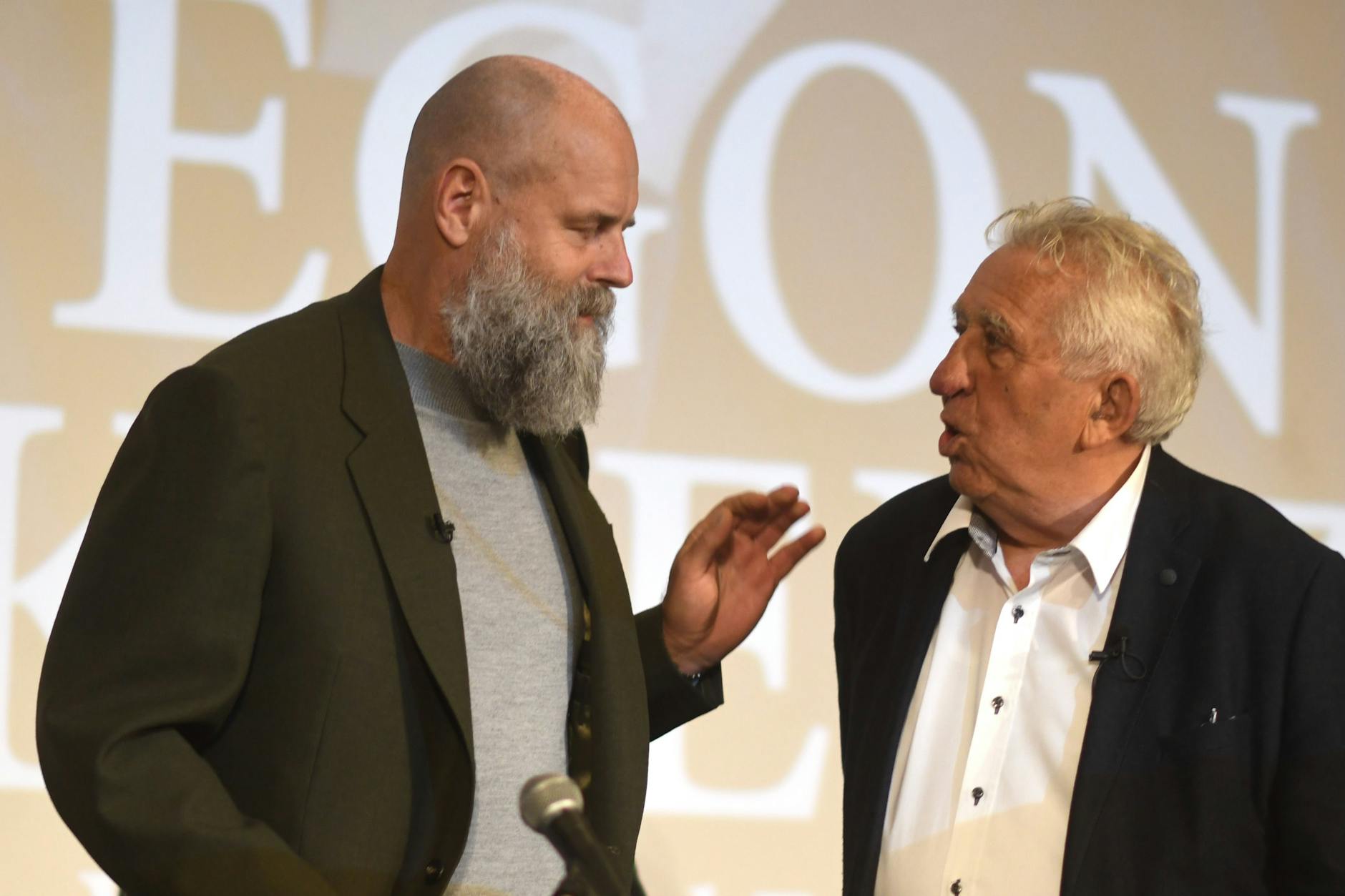Egon Krenz came too late, life punished him: A reckoning with himself

No sooner had I finished reading the weighty political explanatory book “Freedom” by former Chancellor Angela Merkel than the next work from the pile of expected reading literature lay in my hand: “Loss and Expectation”, part 3 of the memoirs of the FDJ and SED top politician Egon Krenz, who was SED General Secretary and Chairman of the GDR State Council in the autumn of 1989 and who coined the term “Wende” (change) into the world.
The consecutive readings revealed some similarities between otherwise very different East Germans: Both are noticeably people from the coast; Merkel took over Krenz's constituency of Rügen ; both have a special relationship with Dierhagen and the discreetly friendly people there, even with the same people. Local ties aside, both had intense affairs with Kairos, the god of opportunity, the right moment. However, they ended very differently.
Angela Merkel always knew how to grasp the fleeting spirit at precisely the right moment, and in her book, she recounts how she discovered a sculpture of the creature with winged heels at a Rostock exhibition in 2019 and purchased the work by Rostock sculptor Thomas Jastram. Angela Merkel explained to the artist that she had spent countless hours pondering the right timing: "You have to catch the right moment. That determines success or failure."
The missed opportunitiesHer affair with Kairos was extraordinarily fortunate: She decided to become a politician when the doors opened for her. She overthrew Chancellor Helmut Kohl when he was faltering through his own fault. She dared to run for the CDU chairmanship when the other men were too weak for it. Thus, she also became chancellor. And finally, Kairos beckoned early enough for her to step down from office of her own volition.
The case of Egon Krenz is quite different. Already on the first page of his new book, under the chapter heading "Nineteen Eighty-Nine," he states: "I was primarily troubled by the missed opportunities in recent months to make necessary changes in our policy in close cooperation with Moscow." This sets the tone for reflection on one's own actions.
Erich Honecker lacked the wisdom of age to resign in time. In Berlin in early October 1989,Mikhail Gorbachev , the leading figure in Moscow, had invoked Cairo with his now world-famous phrase: "Life punishes those who come too late."
Egon Krenz and his allies arrived too late when they finally deposed Erich Honecker and his Politburo entourage. They arrived too late with the promise to reform East German socialism, open the borders to travelers, allow freedom of speech and the press, and reform the electoral system.
The now 88-year-old explains why this had to happen in the third part of his memoirs. Equally remarkable as the description of the events and conflicts within the party and state leadership, in East German society, among its socialist neighbors, in Kohl's Federal Republic, and above all in Gorbachev's Soviet Union, enriched with many previously unknown details from files and records, is the author's attitude: no whining or complaining, no shifting of blame onto others, no kicking down others. Instead, he does examine his own actions and decisions.
So why the hesitation in initiating the generational and policy change so longed for by many? Krenz describes his scruples about simply dismissing the old men, the role models of his youth, who once resisted the Nazis and were imprisoned in prisons and concentration camps. Even as he describes Erich Honecker's galloping loss of touch with reality, there remains an – increasingly desperate – respect. This was bad for the country, but also a sign of loyalty, a decent attitude. Anyone who wishes to pass judgment on Krenz as a historical figure, instead of continuing to ramble on with wild and malicious fabrications, should read these chapters.
One scene in more detail: In Bucharest in early July 1989, one witnessed the Eastern Bloc crumbling during the Comecon summit. The crises in both the GDR and the Soviet Union could no longer be covered up, the Iron Curtain had risen in Hungary – then Erich Honecker suffered a bout of gallstones. On the flight home to Berlin, he asked Krenz to come to his sickbed. Honecker "wanted to talk to someone" and vented his anger: about the hypocrisy of Western politicians, about Gorbachev's flirtations with the West. The bottom line: everyone else is to blame. There are many such eyewitness accounts; no one but Krenz could better preserve for posterity the moods and statements from many one-on-one conversations held at crucial moments. Future historians will appreciate this.
In mid-August, Egon Krenz, long in line to succeed Honecker, accepted his demotion: In the middle of the summer of the GDR's internal disintegration – the Politburo was on vacation, and Honecker was about to undergo surgery – Krenz allowed himself to be sent on compulsory leave. Günther Mittag, the universally disliked economic guru, was to take over. Krenz accepted this without resistance and wrote: "Why did I let myself be sent on vacation so easily?" He asked himself questions: Was it still party discipline, opportunism, or subservience? "I realized that I had failed in a crucial situation. That hurt." Kairos had flitted by. And gone again.

A few pages later, he expresses another insight: While the GDR had been prepared for a military emergency, such as a NATO invasion, "we had never calculated what would happen if our own population no longer followed us, if they withdrew their trust in us because we had lost our credibility as a leadership." Yet this very emergency had occurred: mass refusal to comply and mass exodus. How should one react? Maintain state order with repressive measures? Krenz states: "The GDR constitution did not provide for anything like this."
The key word of the book is in the title: loss. Krenz perceives the end of the GDR, and thus of the socialist experiment on German soil, as a grave loss—socially, but of course also personally. Life has punished Egon Krenz more harshly than many others who have served at the top of the GDR.
That is what the second part of this volume is about: his experiences with his former party, with the all-German victors, and with the judiciary that sentenced him to six years and six months in prison, thereby violating the prohibition of retroactive effects, according to which no one can be punished for acts that were not punishable at the time they were committed.
There are many reasons to be ashamed of a united Germany; the nasty harassment the Berlin prison system used against the prominent political prisoner is particularly embarrassing. For he was the representative of the GDR party and state leadership that had been courted and flattered before 1990—we have the television images before us.
The curious Mr. Schirrmacher from the FAZAll the more reason to read about decent people. People like Frank Schirrmacher , co-editor of the Frankfurter Allgemeine Zeitung. A curious, highly educated man, intent on forming his own opinion instead of perpetuating the perpetually malicious fabrications of several of his colleagues. Schirrmacher himself reported on his encounters with Krenz. He now adds his own account of this unexpected acquaintance. This is also interesting because it has found its extension into the present.
On November 9, 2009, 20 years after the peaceful opening of the border, Schirrmacher wrote in the Frankfurter Allgemeine Zeitung that "some of the essential basic conditions" for this were "created" by Krenz, and added the following sentence from the Berlin Regional Court's Krenz verdict: "In the fall of 1989, the defendant contributed significantly to de-escalating the situation at the time, which could easily have led to a civil war with unforeseeable consequences." Schirrmacher wrote that he did not want to "consign Krenz to Valhalla," but: "Anyone who honors the non-violence and the events of the night of November 9 cannot do so without giving him a decisive role."
When East German publisher Holger Friedrich said the same thing in the Berliner Zeitung ten years later, he was met with a media storm. Things haven't completely calmed down to this day. Holger Friedrich stands by his statement, as was heard again recently at the joint presentation of the Krenz book at the Babylon cinema. Schirrmacher died in 2014. Krenz wrote: "I think we could have become friends." Apparently, a revealing German-German dialogue broke down.

This time, God Kairos has become a friend to Egon Krenz, now 88 years old. This time, he seems to have caught the right moment, as he is publishing the book at a time when more and more young people want to know more about the GDR. The grandchildren are asking questions. A special greeting is addressed to "those born later" at the end of the book. It is addressed to those "who, despite slander and numerous historical falsifications, which can also be found in schoolbooks, are interested in the German workers' and farmers' state."
Indeed, the Western model of society is currently running into troubled waters, so the question of alternatives must arise. Is the GDR, even if it failed, still an inspiration? This book encourages contemporaries to remember and reflect; it deals with crucial days, weeks, and months in their own lives; it gives them something to talk about. The grandchildren will find many answers.
Egon Krenz is clearly at peace with himself. The wisdom of age, the serenity after a lifetime of tension, the distance from the experience of loss, the friendly family environment, the large circle of friends are reflected in a relaxed tone – the man can tell stories pointedly and entertainingly, political clichés have disappeared. At the book launch in the Babylon, he said: It's done. He means the book. The trilogy. His life's work, too, presumably. Perhaps now there's more time for the huge piles of mail and the flood of emails. In any case, his preoccupation with the GDR isn't over.
Berliner-zeitung



